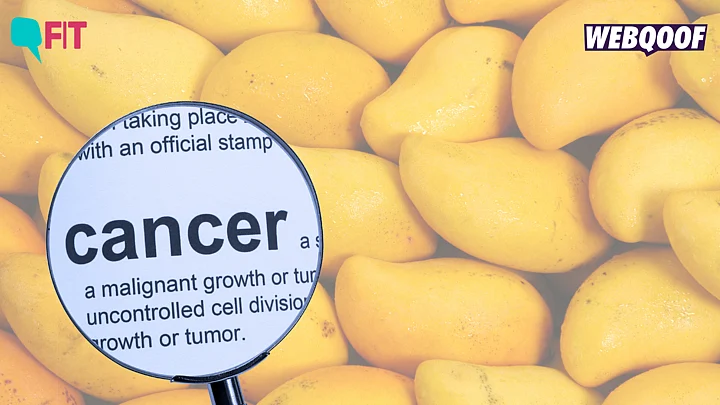A claim has been going viral on social media platforms stating that eating mango peels prevents cancer.
How did we find the truth? FIT spoke to experts – Dr Rajeev Gupta, Director, Internal Medicine, and Dr Mandeep Singh Malhotra, Director, Surgical Oncology, CK Birla Hospital (R), Delhi – to verify this claim.
Dr Rajeev Gupta told FIT, “All parts of mangoes from the kernel, the pulp, the skin, to the leaves, have anti-cancer properties because they contain antioxidants. Mangoes have flavonoids, phenolic compounds, and polyphenols which are good for health.”
Dr Mandeep Singh Malhotra added that mangoes are a rich source of nutrients like vitamin A, vitamin C, and beta-carotene, and unique phytochemicals like polyphenols, triterpenes, and mangiferin.
“These phytochemicals have shown promise in cell lines, in vitro, and animal studies for their antioxidant, anti-inflammatory, and anticancer properties.”Dr Mandeep Singh Malhotra
However, both the doctors told FIT that the medical science behind how mangoes help or protect our health is not yet established.
Dr Malhotra said
“Cancer treatment typically involves surgery, chemotherapy, radiation, and immunotherapy. While these modalities are the standard of care, they can be harsh and often fail to prevent recurrence.”
Dr Malhotra added that we still need “well-designed human trials to determine the optimal dosage, route of administration, bioavailability, side effects, and potential interactions with other medications.”
He flagged that research is still needed to understand the exact quantities of mangoes that would be most effective to reduce the risk of cancer and study the combination of mangoes with other things, and the forms that would help the most.
A 2023 study published in Nature journal, that was studying the "anticancer role of mango peel and seed kernel extracts" had also found that the fruit did contain nutrients like mangiferin that inhibited the cell proliferation of breast cancer cells in female rats. However, there was no clinical evidence of a reduced risk of cancer in humans.
Conclusion: Mangoes have anti-cancer properties, but they are not an “elixir” against cancer, flagged Dr Gupta.
Dr Malhotra said,
“While I can say that mangoes theoretically contain ingredients that might help reduce cancer risk, I would recommend caution. They are not replacements for standard treatment and could even reduce the effectiveness of chemotherapy due to their antioxidant properties. It's important to remember that these fruits should be consumed as part of a healthy diet, not as a standalone medicine or cure.”
(Not convinced of a post or information you came across online and want it verified? Send us the details on WhatsApp at 9540511818 , or e-mail it to us at webqoof@thequint.com and we'll fact-check it for you. You can also read all our fact-checked stories here.)
(At The Quint, we question everything. Play an active role in shaping our journalism by becoming a member today.)
